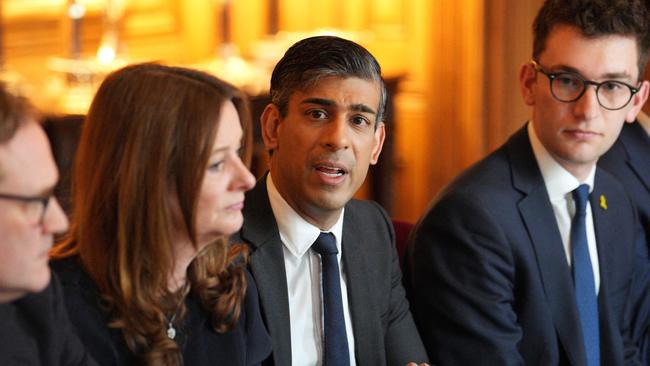Autocratic states pose biggest threat since Cold War: Sunak
Britain faces the most dangerous threat from colluding authoritarian states since the end of the Cold War, says Rishi Sunak.

Britain faces the most dangerous threat from colluding authoritarian states since the end of the Cold War, says Rishi Sunak.
Almost “every aspect of our lives is going to change” given the challenges posed by countries including China, Russia, North Korea and Iran, the British Prime Minister was to say in a speech in London on Monday.
He argues that Britain is at a “crossroads”, in an attempt to hammer home the government’s pledge to boost defence spending to 2.5 per cent of GDP.
“More will change in the next five years than in the last 30,” Mr Sunak says. “I’m convinced that the next few years will be some of the most dangerous yet most transformational our country has ever known.”
The Prime Minister singles out threats to British democracy, the economy and societal values.
He highlights the war in Ukraine, a global rise in immigration and attempts to “undermine our shared values”.
Mr Sunak brands China, Russia, North Korea and Iran an “axis of authoritarian states” to argue that the West must face up to more collusion by adversaries.
He wants to highlight artificial intelligence as a challenge to be turned into an opportunity.
“Our country stands at a crossroads,” he says. “Over the next few years, from our democracy to our economy to our society – to the hardest questions of war and peace – almost every aspect of our lives is going to change.
“How we act in the face of these changes, not only to keep people safe and secure but to realise the opportunities too, will determine whether Britain will succeed in the years to come.”
Senior Tories are hoping to regain trust for security by criticising Labour for refusing to match the commitment to raise defence spending to 2.5 per cent of GDP by 2030.
Labour leader Keir Starmer has committed himself to the same rise but refused to say by when, adding that the jump in defence spending of £87bn ($165bn) a year will happen “as soon as resources allow”.
Tory strategists hope that it will be one of the dividing lines of the general election campaign later this year, and comes after Foreign Secretary David Cameron said Britain’s security would be “on the ballot paper” when voters went to the polls.
Former Tory leader Iain Duncan Smith said, however, that ministers had for too long ignored the threat posed by China. “British politicians and those across the West have failed to face up to the fact that we are facing a new axis of totalitarian states determined to end Western values and replace them with China’s values,” he said.
Labour accused the Tories of putting Britain’s stability at risk.
MP Pat McFadden said nothing Mr Sunak said would change that “over the past 14 years the Conservatives have brought costly chaos to the country, with this being the only parliament in living memory where people’s standard of living will be lower at the end of it than the beginning”.
The Times



To join the conversation, please log in. Don't have an account? Register
Join the conversation, you are commenting as Logout